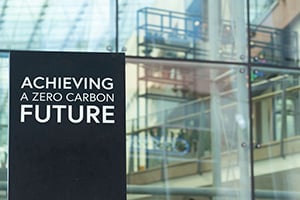 A team of Sustainable Investment Group (SIG) employees completed several projects at a local community garden in Marietta, GA on Thursday, April 16th. Mulching, planting, weeding, and constructing garden features. One of the projects included the building of and installation of a Solitary Bee House. This particular garden where the SIG staff volunteered is in the process of becoming a Certified Pollinator Garden – providing food sources each season for 5 different pollinators such as bees, butterflies, bats, moths and birds. The members of the community garden practice sustainable practices – eliminating the use of chemical fertilizers and pesticides. Members of the garden also educate children who attend the “Head Start” program at the preschool which the garden is located. The day after the SIG team visited the garden, the 3 and 4 year old students were getting a lesson on worms!
A team of Sustainable Investment Group (SIG) employees completed several projects at a local community garden in Marietta, GA on Thursday, April 16th. Mulching, planting, weeding, and constructing garden features. One of the projects included the building of and installation of a Solitary Bee House. This particular garden where the SIG staff volunteered is in the process of becoming a Certified Pollinator Garden – providing food sources each season for 5 different pollinators such as bees, butterflies, bats, moths and birds. The members of the community garden practice sustainable practices – eliminating the use of chemical fertilizers and pesticides. Members of the garden also educate children who attend the “Head Start” program at the preschool which the garden is located. The day after the SIG team visited the garden, the 3 and 4 year old students were getting a lesson on worms!
 According to the Pollinator Partnership: Almonds, blackberries, cucumbers, and artichokes are some of the crops raised in the California Coastal Chaparral Forest that rely on honey bees and native bees for pollination. Peaches, strawberries, watermelon, and cauliflower are some of the crops raised in the Southeastern Mixed Forest that rely on honey bees and native bees for pollination. Apples, tomatoes, citrus, melons, and strawberries are some of the crops raised in the Outer Coastal Plain Mixed Province that rely on honey bees and native bees for pollination. Alfalfa, cucumbers, raspberries, apples, and strawberries are some of the crops raised in the Cascade Mixed Forest that rely on honey bees and native bees for pollination.
According to the Pollinator Partnership: Almonds, blackberries, cucumbers, and artichokes are some of the crops raised in the California Coastal Chaparral Forest that rely on honey bees and native bees for pollination. Peaches, strawberries, watermelon, and cauliflower are some of the crops raised in the Southeastern Mixed Forest that rely on honey bees and native bees for pollination. Apples, tomatoes, citrus, melons, and strawberries are some of the crops raised in the Outer Coastal Plain Mixed Province that rely on honey bees and native bees for pollination. Alfalfa, cucumbers, raspberries, apples, and strawberries are some of the crops raised in the Cascade Mixed Forest that rely on honey bees and native bees for pollination.
(Find the planting guide that is appropriate for your ecoregion, here.)
A Cornell University study estimated that honeybees annually pollinate $14 billion worth of seeds and crops in the U.S. Essentially, if honeybees disappear, they could take most of our insect pollinated plants with them. Humans’ intense agricultural practices and increased use of pesticides have affected the pollination practices of bees within the U.S. as well as the pollinator population.
These are but a few links that guide you to create your own certified pollinator garden:
Environmental Education Alliance of Georgia
Learn how to build your own solitary bee house, here.
Sustainable Investment Group (SIG) commits to doing a Philanthropy Event each quarter. This event was actually one of two events for Q2 this year. The second team of seven SIG employees volunteered at a child care center run by Easter Seals of North Georgia on the same day.
© 2015 Sustainable Investment Group (SIG). All Rights Reserved.



